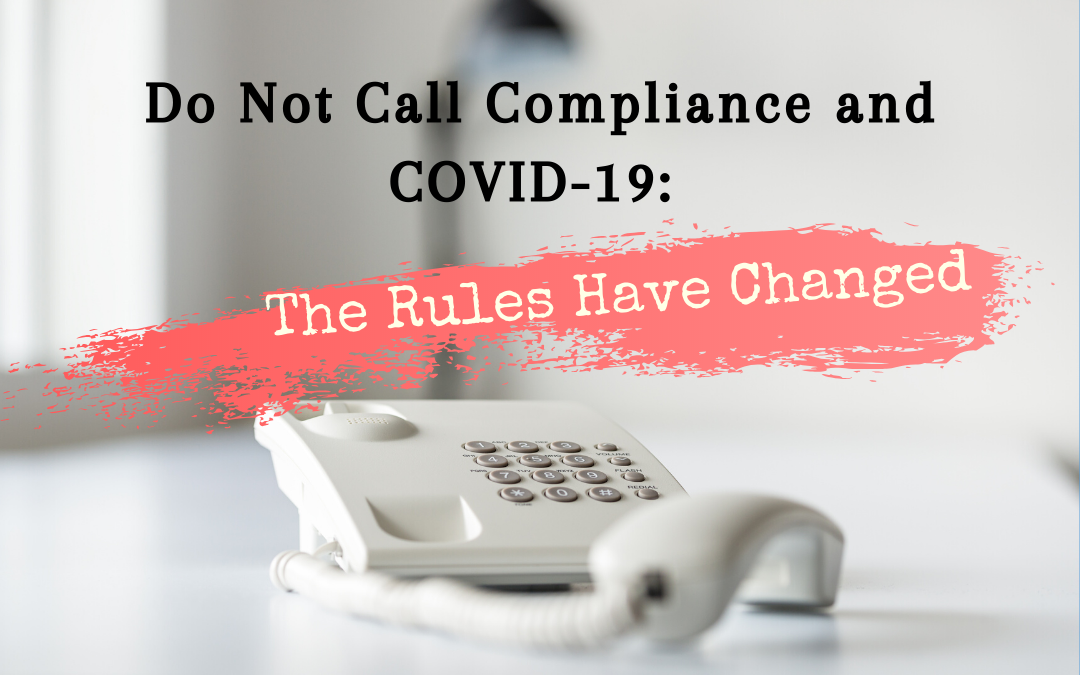During this time of uncertainty, the regulations around Do Not Call compliance are changing, too. Are you playing by the new rules?
It should come as little surprise that rules, regulations, and laws are in flux as a result of COVID-19. Governors and mayors are passing executive orders regarding everything from schools to retail shops to restaurants to parks. And just when we think things are settling down, something new changes.
Of course, some parts of our lives are holding steady. You’ll still lose a sock every time a pair goes into the dryer. And it’s pretty much a guarantee that someone, somewhere, is working on a new Star Wars movie. But for those of us making sales calls, changes in Do Not Call compliance and phone sales regulations have given us a little more to pay attention to.
You know the basics already: Do Not Call compliance regulates who you can call, when you can make those calls, and what information you are required to present. For the most part, Do Not Call compliance is not nearly as complicated as it seems at first glance.
In short, don’t make marketing or sales calls before 8 a.m. or after 9 p.m., don’t call anyone on the Do Not Call Registry, do tell people who you are and why you’re calling, and keep records of your calls. Pretty simple.
But as COVID-19 has altered our reality, the federal government, as well as state governments, have changed many of the rules. In some cases, these new regulations make telesales and Do Not Call compliance easier than ever. In other cases, you run a much higher risk of violating the law.
Stay in compliance with software that knows the rules. Check out a free demo right now to see how our system helps keep you out of trouble.
Do Not Call: Compliance and success in a changing world
Not all of these “new” rules are a result of COVID-19. For example, in December of 2019, prior to any knowledge of COVID-19 in the U.S., Governor Andrew Cuomo of New York signed legislation that prohibits unsolicited sales calls to individuals “during a declared state of emergency.” That very plainly means if you make any unsolicited sales call to any person in New York during a state of emergency, such as COVID-19 has predicated, you are in violation of telesales and Do Not Call compliance regulations.
There are some important distinctions to point out, though. To begin with, you are allowed to make calls to someone with whom you already have a business relationship. And there appears to be a distinction between an individual and a commercial business. Be aware, though, that violations are punishable by a fine up to $11,000 for each offense.
Louisiana has similar regulations in effect. By contrast, West Virginia only restricts “false, misleading or deceptive information,” which is a violation of federal laws already in place.
To address confusion specifically around the Do Not Call Registry, the Telemarketing Consumer Protection Act (TCPA) makes explicit that there are exceptions for hospitals, health care providers, and government officials to make calls for emergency purposes and to provide time-sensitive and necessary information. But the FCC makes clear the exceptions do not include coronavirus-related commercial advertisements, such as health insurance, cleaning services, or grocery delivery services.
State-specific changes
Do Not Call compliance isn’t the only issue many telesales professionals have to worry about, though. For instance, some states typically require operators in specific industries to conduct business from a licensed location.
Oregon, for example, normally requires mortgage lenders, mortgage loan servicers, and consumer finance companies to transact business “with a licensed company at a location that holds an Oregon license.” Violations of this regulation could result in $5,000 civil penalties for each infringement. In other words, they can’t work from home.
On March 12, 2020, the Oregon Division of Financial Regulation suspended those regulations, stating employees in those industries could work from home under certain conditions, including the condition that “employees may not keep any physical business records” at home.
Similar regulations went into effect in Iowa, New Jersey, Connecticut, and many other states. The California Department of Business Oversight is taking a similar, but slightly expanded, approach to include escrow agents and finance lenders.
The easing of restrictions makes it easier, at least temporarily, for phone sales in these industries to continue. The catch, of course, is that you need to keep consumer information outside of your home. However, it appears that information in the cloud (such as is standard with dialing software like Call Logic) would be acceptable since it is neither physical nor kept on-premises.
People may be more likely to answer your call
There are some more bright spots for phone sales professionals, too. A New York Times article points out that, with the reduction of robocalls, people are more likely to answer calls and spend time talking. And while that is specific to interviewers and pollsters, it’s not hard to extrapolate that if you are a good listener and express care, you could have the opportunity to spend more time talking with more people.
Does that make a sale? Maybe. Maybe not. But when the time comes to renew a life insurance policy or take out a new business loan, don’t you think that people would be more inclined to go with someone who spent time talking to them and listening to their concerns?
Do Not Call compliance, and all the associated regulations around telephone sales aren’t going away. And to be truthful, changes in those regulations aren’t anything new. Sure, the basic premises of the TCPA and the TSR remain the same. And, yes, they are generally simple enough to follow. But with each state having different regulations (Did you know the state of Rhode Island requires you to register with the Office of the Attorney General Consumer Protection Unit and pay a filing fee within ten days of doing business in the state?), keeping up with compliance should be a regular part of your business. This isn’t that different.
Remember to check state laws, follow government guidelines, and play it safe if you have doubts, and then you should be in good shape.
Use TCPA-compliant software like Call Logic so you can stop worrying and start focusing on your business. Schedule a free demo right now to find out more!
Please note that this post is for informational purposes only and should not be considered as professional legal advice.

